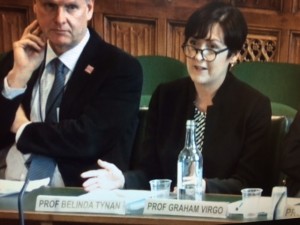 A plan to measure the quality of teaching in English universities has been contributed by a member of the OU’s top team.
A plan to measure the quality of teaching in English universities has been contributed by a member of the OU’s top team.
Professor Belinda Tynan, the OU’s pro-vice-chancellor for learning & innovation, joined senior university figures to give their views on the government’s proposals to introduce a teaching excellence framework (TEF). She was one of five witnesses giving oral evidence to the House of Commons Business, Innovation & Skills (BIS) Select Committee, part of a session on assessing quality in higher education in England.
The proposed TEF is a way for the government to monitor and assess the quality of teaching in English universities; to ensure university students get an excellent teaching experience and that as much status is given to teaching as to research. The framework will also give students a way to judge the quality of teaching before they commit to signing up for a course and will measure the credentials of universities in widening access to students from all backgrounds – a move which the OU welcomes. The introduction of the TEF is then likely to be taken up across the UK.
The OU was invited as a witness before MPs as it represents a very unique type of university, but one that is renowned for its teaching excellence. Since the plans for a TEF were first revealed earlier this year, the OU has therefore been engaging with key officials to help ensure it would work well for all modes of teaching and learning, including part-time distance learning.
Speaking to the BIS committee of MPs in Westminster on 17 November 2015, Professor Tynan said she supported the introduction of a framework, but advised it should consider the diversity of higher education institutions and student aspirations. Some of these concerns were also shared the other universities present – Cardiff University, Cambridge University, The University of Chichester and The University of East Anglia.
A number of the witnesses on the panel – including Professor Tynan – argued that using employment statistics and degree completion as an indication of teaching quality failed to take into consideration the many reasons people choose to go to university, such as out of personal interest or to do individual modules. All witnesses also told MPs that the 2017 timeframe was ambitions if the TEF is to add value and be really rigorous.
Professor Tynan proposed that TEF should consider the ‘learning gain’ that students get during their entire time at university. This approach would be similar to that currently used in schools and she highlighted that research is already underway by HEFCE in this area.
If it goes ahead, the government has proposed that the first version of TEF (judged on basic measures to start with) be implemented by 2017.
Watch the full session on Parliament TV
For more about TEF read: Teaching excellence framework (TEF): everything you need to know



